Sometimes, we use “otherwise” as an adverb to modify another verb. Take the sentence “unless otherwise specified” as an example. It would help to know where “otherwise” is supposed to be placed before writing it yourself.
Is It “Unless Otherwise Specified” Or “Unless Specified Otherwise”?
“Unless otherwise specified” and “unless specified otherwise” are both correct. “Otherwise” is an adverb, and we use it to modify the verb “specified” in these examples. The placement of the adverb does not matter, as long as the modification is clear and succinct.
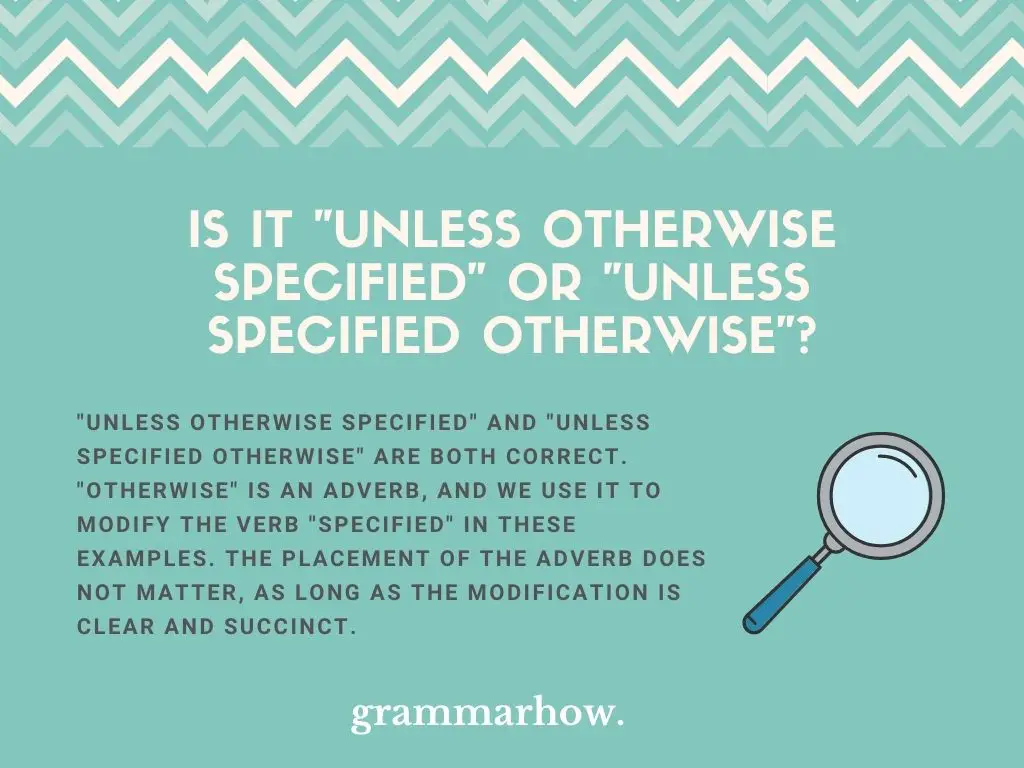
To help you understand it, you might benefit from seeing how other adverbs might interact with sentences:
- He spoke calmly.
- He calmly spoke.
As you can see, “calmly” is modifying “spoke” here, but the placement is irrelevant. Both of the above examples are correct. The only reason we might change the position of “calmly” is because of personal preference or what we deem appropriate for our writing.
Therefore, the same is true of “otherwise.” It’s an adverb, and the only reason we might move it in a sentence is whether it sounds better before or after the verb.
- That will be all you need to know unless otherwise specified.
- That will be all you need to know unless specified otherwise.
What Does “Unless Otherwise Specified” And “Unless Specified Otherwise” Mean?
It might help to know more about what the phrases mean. Luckily, they’re identical in meaning, so once you know one, you know the other!
“Unless otherwise specified” means that something should be accepted as true. The only time it would ever not be “true” is if somebody “specified” something that would “otherwise” prove it false.
Using this phrase allows people to wait to hear more information. For the time being, they’re expected to work with the information they have. However, there might come a time when someone will give them more information that might change how they do something.
Examples Of How To Use “Unless Otherwise Specified” And “Unless Specified Otherwise” In A Sentence
Perhaps a few more examples will help you to understand more about it.
- Unless otherwise specified, I will expect you all to be in this room by nine o’clock tomorrow morning.
- Unless specified otherwise, we will still be coming to work during these hard times because we need to be the backbone of this economy.
- You will keep coming in unless otherwise specified. Do not make me write you up for your behavior.
- I think you will find it quite easy to do it this way unless specified otherwise by someone who knows more than me.
- Unless otherwise specified, I don’t think there’s any reason why we can’t come in at a later date to get this done.
- Unless specified otherwise, you will all be expected to hand in a project related to your findings on this issue.
- There will be no more paid leave until the holidays are over unless otherwise specified. Do I make myself clear?
- There can be no more errors on this project unless specified otherwise. It’s too important to throw something like this away.
Both phrases are correct, and we’ve provided examples of both to prove this to you. “Otherwise” modifies “specified” to show that someone should accept the information or current events as is. The events might change if someone says so, but this is not guaranteed.
We can use the phrase both to start and to finish a sentence. The placement of the phrase doesn’t matter (just like the placement of “otherwise”). However, placing it at the start of the sentence does put more emphasis on what to expect from the specifications.
Is “Unless Otherwise Specified” Or “Unless Specified Otherwise” Used The Most?
It might help to go over some statistics related to which one is more common. Then, you might have more of an understanding of what to use yourself.
According to Google Ngram Viewer, “unless otherwise specified” is more popular. Historically, it has been vastly more popular than “unless specified otherwise,” but it seems like they are becoming much closer in usage in recent times.
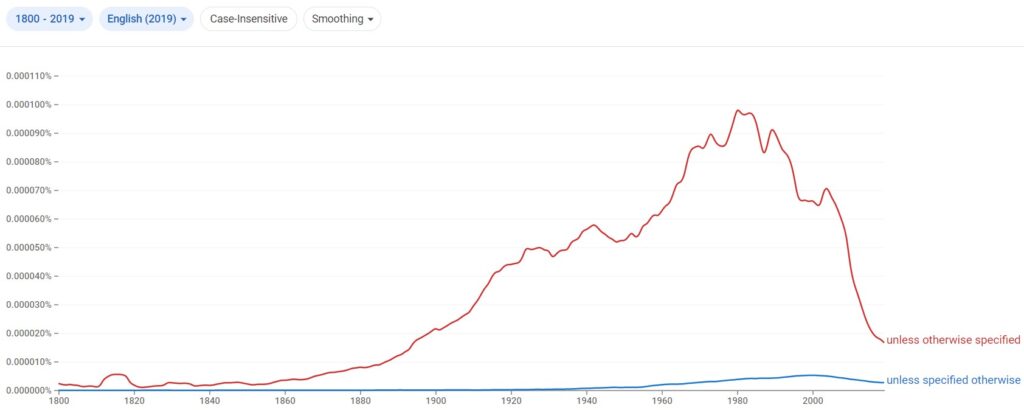
Most people prefer to place “otherwise” before the verb to show that it is directly modifying the outcome and action.
Is “Unless Otherwise Specified” And “Unless Specified Otherwise” Used Differently In The UK And The US?
There isn’t much difference between the phrases when we look at UK and US English graphs, either.
According to Google Ngram Viewer, “unless otherwise specified” is the most popular choice in American English. The graph follows a very similar pattern to what we saw from the one above.
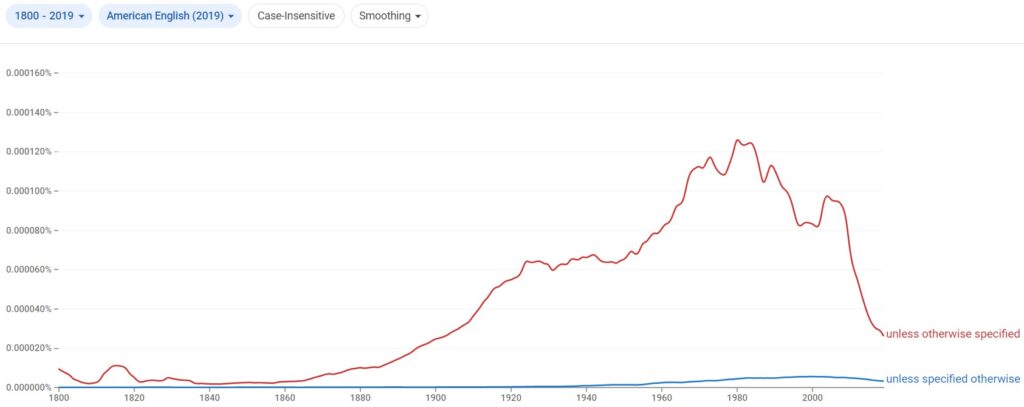
Also, according to Google Ngram Viewer, “unless otherwise specified” is more popular in British English. The graph is also more clear here, showing that “unless otherwise specified” is the more popular choice and hasn’t lost much popularity.
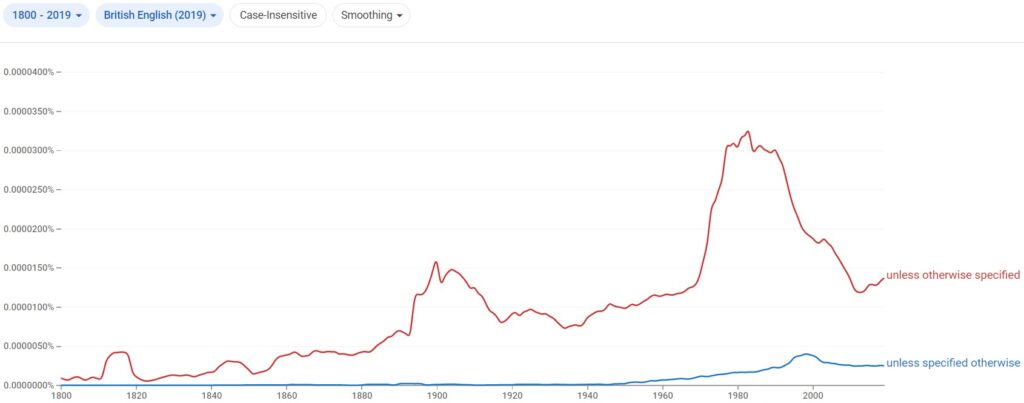
American and British English both use “unless otherwise specified” more frequently. However, it seems to be a much more popular phrase in British English than in American English.
Do The Same Rules Apply To “Unless Otherwise Noted” And “Unless Noted Otherwise”?
The verb choice doesn’t change the popularity of the phrase either. It might help to see a graph to prove that.
According to Google Ngram Viewer, “unless otherwise noted” is the most popular choice of the two. This shows that it’s always more popular to follow the rules of placing “otherwise” before the verb rather than after it.
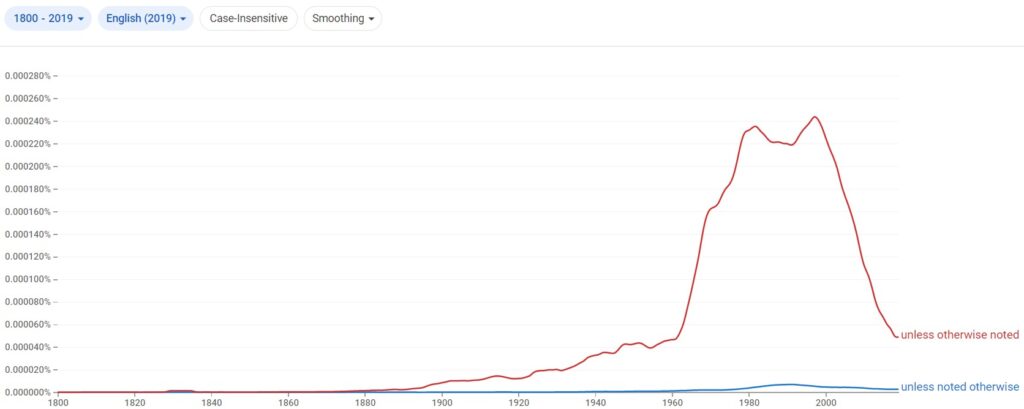
Placing the adverb before the verb just gives us a better chance to modify it. It adds emphasis to the verb, which allows the reader to show that it is important to pay attention to how it is modified.
“Unless Otherwise Specified” And “Unless Specified Otherwise” – Synonyms
Finally, let’s go over some synonyms that you might be able to use for the phrases. Some of these will give you a much better idea of how to use alternatives:
- Unless otherwise stated
- Unless stated otherwise
- Unless otherwise told
- Unless told otherwise
- If not otherwise specified
- Except if otherwise stated
- Save as otherwise mentioned
- Or otherwise mentioned

Martin holds a Master’s degree in Finance and International Business. He has six years of experience in professional communication with clients, executives, and colleagues. Furthermore, he has teaching experience from Aarhus University. Martin has been featured as an expert in communication and teaching on Forbes and Shopify. Read more about Martin here.
